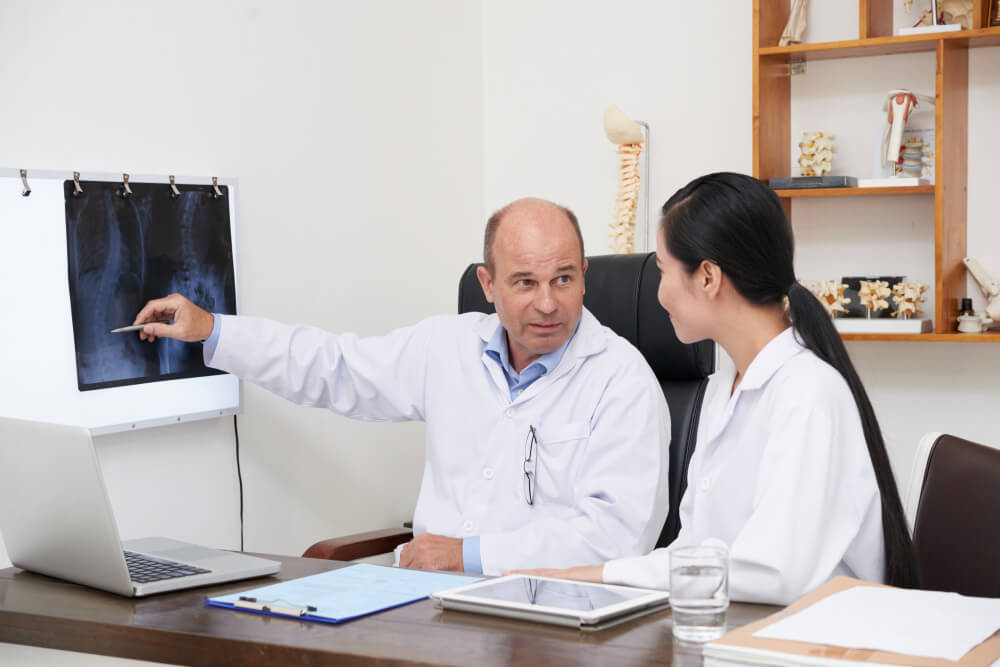Spine Specialists: Correcting Spinal Deformities
Spinal deformities occur when the spine deviates from its natural curvature. These deformities can cause pain, difficulty breathing, and other health problems. Spine specialists, such as orthopedic surgeons and neurosurgeons, are experts in diagnosing and treating spinal deformities.
Common Types of Spinal Deformities
Several types of spinal deformities can affect individuals of all ages. Some of the most common types include:
Scoliosis
Scoliosis is a sideways curvature of the spine. It can be congenital (present at birth), idiopathic (cause unknown), or acquired (due to injury or disease).
Kyphosis
Kyphosis, often referred to as “hunchback,” is an excessive forward curvature of the spine, typically in the upper back.
Lordosis
Lordosis, also known as “swayback,” is an excessive inward curvature of the spine, often in the lower back.
The Role of Spine Specialists
Spine specialists play a crucial role in diagnosing and treating spinal deformities. They can:
- Conduct a Physical Examination: Assess your posture, range of motion, and any areas of pain or tenderness.
- Order Imaging Tests: Use X-rays, MRI, or CT scans to visualize the spine and identify the severity of the deformity.
- Develop a Treatment Plan: Create a personalized treatment plan tailored to your specific needs.
Non-Surgical Treatment Options
In mild cases of spinal deformity, non-surgical treatments may be sufficient to manage symptoms and slow the progression of the condition. These treatments may include:
- Physical Therapy: Exercises to strengthen the back muscles and improve posture.
- Bracing: Bracing can help correct mild spinal deformities, especially in adolescents.
- Medications: Pain medications and muscle relaxants can help alleviate pain and discomfort.
Surgical Treatment Options
For more severe spinal deformities, surgery may be necessary to correct the deformity and improve spinal function. Common surgical procedures for spinal deformities include:
Spinal Fusion
Spinal fusion involves fusing two or more vertebrae together to stabilize the spine and correct the deformity.
Vertebral Osteotomy
A vertebral osteotomy involves cutting and reshaping the vertebrae to correct the deformity.
Spinal Instrumentation
Metal rods, screws, and hooks may be used to support the spine during and after surgery.
Rehabilitation After Surgery
Rehabilitation is an essential part of the recovery process after spinal surgery. Physical therapy can help you regain strength, flexibility, and range of motion.
- Physical Therapy Exercises: Your physical therapist will prescribe exercises to help you recover.
- Gradual Return to Activity: You will gradually increase your activity level over time, starting with gentle exercises and progressing to more challenging activities.
- Follow-up Appointments: Regular follow-up appointments with your spine specialist are important to monitor your progress and address any concerns.
Preventing Spinal Deformities
While not all Spinal deformities can be prevented, there are steps you can take to reduce your risk:
- Maintain Good Posture: Good posture can help prevent spinal deformities.
- Regular Exercise: Regular physical activity can help strengthen the back muscles and improve flexibility.
- Proper Lifting Techniques: Lift heavy objects with your legs, not your back.
- Ergonomic Workplace: Ensure your workplace is ergonomically designed to minimize stress on your back.
- Healthy Weight: Maintaining a healthy weight can reduce stress on the spine.
Conclusion
Spinal deformities can significantly impact a person’s quality of life. By seeking early medical attention and following a comprehensive treatment plan, individuals with spinal deformities can improve their symptoms and regain their mobility. Spine specialists play a vital role in diagnosing and treating spinal deformities, helping patients achieve optimal spinal health and well-being.
Schedule an appointment with our Spine care clinic for Spinal fusion surgery for correcting spinal deformities (214) 949-8918 Or Visit us https://specialtycareclinics.com/


